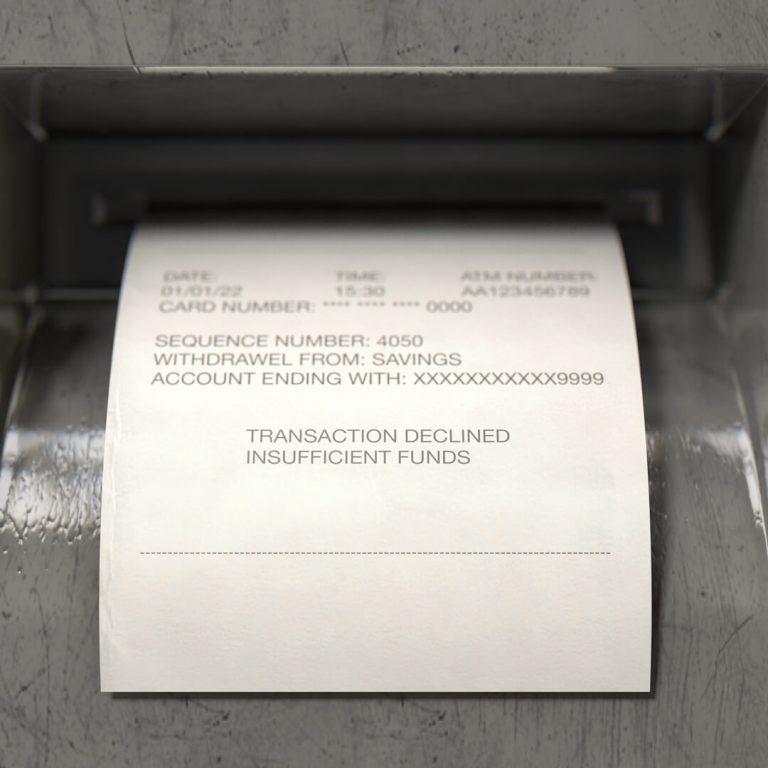Sometimes we outspend what’s in our checking account. This typically happens when money is tight and an emergency expense pops up, but it can also occur for other reasons. For example, a super busy person might forget to deposit a check before making a sizable purchase which that money was meant to cover. When transactions like these cause your available balance to dip below $0, you may incur a nonsufficient funds (NSF) fee (also known as insufficient funds).
What are NSF fees?
Financial institutions typically offer overdraft protection with their checking accounts. Consumers who opt in for this service can expect transactions—up to a set limit—to go through even if it will cause a negative balance. In other words, the bank or credit union covers the overdrawn amount, a sum you’ll have to repay.
When you don’t have overdraft protection and you submit check or debit card transactions that exceed your available balance, financial institutions typically reject these transactions and may charge you NSF fees for them. The same is true for electronic payments, such as wires, ACH transfers or person-to-person (P2P) transactions via a mobile payments app like Zelle®.

In such situations, the merchants you were attempting to pay may also charge you a returned check fee and, possibly, a late fee if your eventual payment isn’t received on time.
For example, let’s say Paul writes his landlord a rent check in the amount of $1,000 when he only has $975 in his checking account. He doesn’t have overdraft protection to cover the $25 disparity, so his financial institution rejects the check and charges him an NSF fee of $37. In addition, his landlord charges him a $50 returned check fee and a $40 late fee. His original $1,000 rent payment ends up costing him $1,127.
Are overdraft fees the same as NSF fees?
Even though they occur for the same reason—an overdrawn account—overdraft fees are different from NSF fees. When you have overdraft protection, your financial institution allows check, electronic payments and debit card transactions that exceed your available balance to go through rather than rejecting them. However, you typically pay an overdraft fee for such transactions in addition to repaying your bank or credit union the amount it advanced you to cover them.
For example, if Paul has overdraft protection in the above example, his financial institution will allow the rent check to go through, keeping him in good standing with his landlord. However, he’ll need to repay his bank or credit union the $25 it advanced him as well as an overdraft fee. If he also uses his debit card to buy $75 worth of groceries and $50 in gas when he’s already overdrawn, he’ll also incur his institution’s overdraft fee for each of those transactions.
It’s important to note that financial institutions may only charge an overdraft or an NSF fee, never both for the same transaction.
How can you avoid NSF fees?
There are several things you can do to avoid NSF fees:
- Creating and maintaining a budget: Of all the important documents that protect you and/or your money, a budget tops the list. It helps you wisely allocate your income between your needs, wants and goals, which keeps you from spending more than you make. This significantly lessons the risk that you’ll overdraw your checking account.
- Monitoring your account: It’s also a good idea to keep a close watch on your checking account via online or mobile banking. This habit will help ensure you have enough money to cover your immediate and upcoming necessary expenses. And if you don’t have enough, it gives you a chance to do something about it, such as transferring money from another account if possible or delaying the payment until you can replenish your checking account balance.
- Looking at your available balance: While monitoring your account, understand that financial institutions typically list two types of balances: a current balance and an available balance. The former reflects all purchases and deposits that have been fully processed. The latter is your current balance minus any pending transactions. As the name suggests, your available balance represents the money you have available to spend.
- Taking advantage of automatic alerts: If your bank or credit union offers text or email balance alerts, sign up to receive them to help with your account monitoring.
- Signing up for direct deposits: Get quicker access to your hard-earned money by opting to have your employer direct deposit your paycheck into your checking account.
- Using Mobile Deposits (also known as Remote Deposits): When you receive physical checks, don’t wait to deposit them at your local branch or nearby ATM. Deposit them immediately using the remote deposit feature in your mobile banking app.
- Building a cash cushion: In addition to an emergency fund located in a separate checking or savings account, try to build a cushion of never-to-use cash in the checking account you use for everyday purchases. Just think, if you give up your weekday morning $10 coffee and allocate that toward this goal, you’ll have a $200 cushion in just one month.
Finally, as discussed above, opting in for overdraft protection is another way to avoid NSF fees and rejected transactions. When used as intended, this protection can help you navigate the occasional emergency situation that causes your balance to dip below $0.






Comments Section
Please note: Comments are not monitored for member servicing inquiries and will not be published. If you have a question or comment about a Quorum product or account, please visit quorumfcu.org to submit a query with our Member Service Team. Thank you.